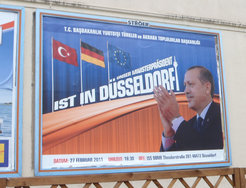Emotional Motives for Erdoğanism in the Turkish Diaspora
Nagehan Tokdoğan
Political choices and voting behaviours are mostly regarded as “rational” orientations. By involving emotions as an analytical category, my research project aims to overcome the rational–emotional dichotomy and consider political choices as manifestations of emotions drawn from daily social experiences. To this end, I am investigating the emotional motivations of Germany’s Turkish migrants in supporting Recep Tayyip Erdoğan as president.
Thus far, I have conducted 11 in-depth interviews and two focus group interviews with first- and second-generation migrants of Turkish origin living in Berlin. When discussing the past, they rely heavily on a narrative of humiliation, linking the degrading attitudes of German society and institutions toward them with their religious and national identity as Muslim Turks. They strongly identify with their nationality and construct the narrative of humiliation as not only an individual experience but a collective and national one. Through my research, I have encountered several consequences of this narrative, the most salient being ethnocentric withdrawal: the tendency to cling to one’s own culture and identity by idealizing it. The interviewees perceive Erdoğan as a “savior” of their national honor as he encourages them to preserve their own national identity from assimilation and, more importantly, promises they are not “alone” although they do not live in their home country. The most prevalent reason for their admiration seems to be Erdoğan’s “strong leader” image on the world stage; they also appreciate his leadership traits, such as strength, decisiveness, and persistence. They tend to identify him with the Turkish nation as a whole—drawing on nationalistic imagery about Turkey’s glorious imperial past.
I propose to read my interviewees’ over-reliance on and admiration of Erdoğan as a manifestation of collective hubristic pride that goes hand in hand with a constant perception of threat to the core of national identity. I argue that Erdoğanism in the Turkish diaspora is closely associated with this hubristic pride, which functions as a quest for compensation for collective low self-esteem; those whose self-perception has been previously wounded are more likely to tend toward authoritarian leaders. Such an attachment also reshapes the nation’s self perception and seems to partially satisfy the emotional need for unity, visibility, worthiness, and perfection.
Scholars studying migration to Europe claim that countries such as the Netherlands and Belgium have adopted more multicultural models that encourage immigrants to participate in wider society while retaining their traditions and values. Germany's “guest-worker” policy dating from the 1960s has, in contrast, led to a segregational/assimilational model being favoured until recently. Studies exploring the integration experiences of other migrant groups in Germany reveal similar problems to those experienced by Turkish immigrants, but it is important to note that cultural proximity to European norms and institutions is an important factor in the level of “integration.” For a clearer insight into the migrant populations in Germany, more comprehensive ethnographic investigations that shed light on their experiences and emotions are needed.

